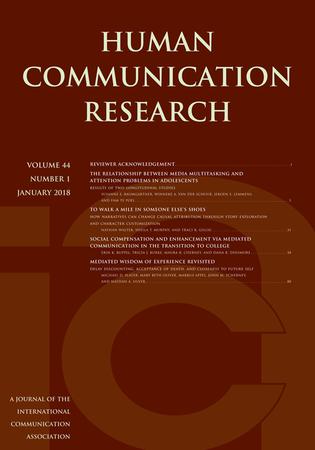That’s so immoral! Investigating the effects of moral violations reported in the form of (in)complete moral dyads in news articles on emotions and memory
IF 4.4
1区 文学
Q1 COMMUNICATION
引用次数: 0
Abstract
As journalists are expected to report on events where expectations and rules are transgressed, they often report on moral violations (such as murder, tax evasion, or unjust political decisions). Exposed to journalistic reports on violations of their moral principles, individuals instantly feel that these actions are wrong. According to theories of morality, immorality perceptions are associated with specific cognitive and affective reactions. In two studies, we used the concept of a moral dyad to (a) define moral news content and (b) analyze emotional reactions and memory effects of intuitive perceptions of immorality. In both studies, immorality led to higher levels of anger and compassion, but impaired memory with effects hinging on perception of immorality. These perceptions further did not differ across different presentations of dyads. Our findings show the usefulness to employ a lens of morality to look at the entire news production and reception process.这太不道德了!调查新闻文章中以完全道德对偶形式报道的道德违反对情绪和记忆的影响
由于记者被要求报道违反预期和规则的事件,他们经常报道违反道德的行为(如谋杀、逃税或不公正的政治决定)。当人们看到违反道德原则的新闻报道时,他们会立刻觉得这些行为是错误的。根据道德理论,不道德的感知与特定的认知和情感反应有关。在两项研究中,我们使用道德对偶的概念来(a)定义道德新闻内容,(b)分析对不道德行为的直觉感知的情绪反应和记忆效应。在这两项研究中,不道德行为导致了更高水平的愤怒和同情,但对记忆的影响取决于对不道德行为的感知。这些认知在不同的双性体呈现中也没有差异。我们的研究结果表明,用道德的视角来看待整个新闻生产和接收过程是有用的。
本文章由计算机程序翻译,如有差异,请以英文原文为准。
求助全文
约1分钟内获得全文
求助全文
来源期刊

Human Communication Research
COMMUNICATION-
CiteScore
8.20
自引率
2.00%
发文量
28
期刊介绍:
Human Communication Research is one of the official journals of the prestigious International Communication Association and concentrates on presenting the best empirical work in the area of human communication. It is a top-ranked communication studies journal and one of the top ten journals in the field of human communication. Major topic areas for the journal include language and social interaction, nonverbal communication, interpersonal communication, organizational communication and new technologies, mass communication, health communication, intercultural communication, and developmental issues in communication.
 求助内容:
求助内容: 应助结果提醒方式:
应助结果提醒方式:


